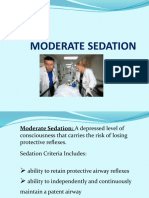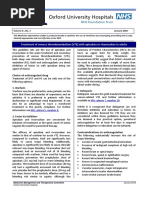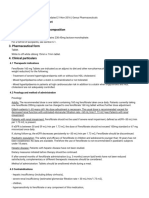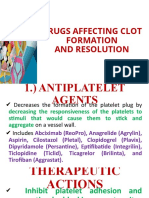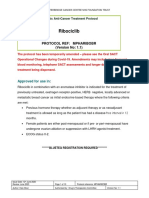Information For Pharmacists On Managing Warfarin Drug Interactions
Information For Pharmacists On Managing Warfarin Drug Interactions
Uploaded by
Belladonna Perdana PutraCopyright:
Available Formats
Information For Pharmacists On Managing Warfarin Drug Interactions
Information For Pharmacists On Managing Warfarin Drug Interactions
Uploaded by
Belladonna Perdana PutraOriginal Description:
Original Title
Copyright
Available Formats
Share this document
Did you find this document useful?
Is this content inappropriate?
Copyright:
Available Formats
Information For Pharmacists On Managing Warfarin Drug Interactions
Information For Pharmacists On Managing Warfarin Drug Interactions
Uploaded by
Belladonna Perdana PutraCopyright:
Available Formats
Information for Pharmacists on Managing
Warfarin Drug Interactions
Established and clinically important interactions.
DRUG INTERACTION
Anabolic steroids + related Increased anticoagulant effect and bleeding seen. Avoid concurrent
drugs (e.g. Danazol) use. If this is not possible, close monitoring of INR is advisable if
danazol is added to established anticoagulant regime; dose of warfarin
should be reduced accordingly.
Amiodarone Anticoagulant effect may be significantly increased. Bleeding may
occur if warfarin dose not reduced appropriately. The interaction
begins to develop within a few days and is usually maximal by 2 to 7
weeks. Interaction may persist for several weeks after amiodarone is
stopped. Monitor INR closely and consider reducing the dose of
warfarin by 1/3 up to 2/3 if amiodarone is added to already established
anticoagulant regime.
Barbiturates Anticoagulant effect reduced. Full therapeutic anticoagulation may
(+ Primidone) only be achieved by a 30-60% increase in warfarin dose. The
interaction occurs within 2-4 days, with maximal effect after 3 weeks.
Monitor INR and increase dose accordingly.
Carbamazepine Metabolism of warfarin is increased by carbamazepine leading to
reduced anticoagulant effect. Monitor INR if carbamazepine added to
patient established on warfarin and consider dose increases as
appropriate.
Co-trimoxazole Increased anticoagulant effect and bleeding. High incidence of
interaction. Warfarin dose should be reduced and INR well monitored.
Cranberry Juice Increased anticoagulant effect, in some cases marked. Avoid
concomitant use unless health benefits outweigh risk. See CSM
advice October 2004.
Fibrates Increased anticoagulant effect. In some cases severe bleeding has
been seen. Incidence of interaction 20-100%. Warfarin dose
reductions of 1/3 to ½ may be needed to avoid bleeding. Monitor INR
closely.
Fluconazole Increased INR and bleeding. Monitor levels well and gradually reduce
warfarin dose appropriately (approx. 20% reduction required with
50mg fluconazole daily, ranging to a 70% reduction with 600mg
fluconazole daily).
Fluorouracil and related Increased INR and anticoagulant effects. Several reports of
prodrugs (e.g. capcitabine) overcoagulation. Prothrombin times and INR should be regularly
monitored, with possible need to reduce dose of warfarin.
Metronidazole Anticoagulant effects of warfarin can be markedly increased. Monitor
INR and adjust warfarin dose accordingly.
Miconazole Anticoagulant effects markedly increased (bleeding can take 15 days
to develop, raised INR can occur within 3 days). Oral miconazole
should not be given unless INR closely monitored and suitable dose
reductions made (usually halving). Interaction is also seen with oral
gel, and has also been reported after vaginal administration.
Monitoring required for all routes.
Rifampicin Anticoagulant effects markedly reduced. Seen within 5-7 days and
persists for 2 to 5 weeks after withdrawal. Warfarin dose may need to
Page 1 of 4
Warfarin Drug Interactions
Worthing and Southlands Hospitals, Pharmacy Dept
Author: Medicines Information Service Manager Oct 2009
Review date: October 2011
be doubled or trebled, and then reduced by equivalent amount
following withdrawal of rifampicin.
St John’s Wort Moderate reduction in anticoagulant effect
Avoid concomitant use since amount of active ingredient may vary in
St John’s Wort products. see CSM advice.
Sulfinpyrazone The anticoagulant effect of warfarin is markedly increased and serious
bleeding has occurred. If used concurrently monitor INR well and
reduce warfarin dose, possibly by half.
Sulphonamides High incidence of interaction with co-trimoxazole. Warfarin dose
should be reduced and prothrombin times well monitored. Little
information with other sulphonamides but advice should be as for co-
trimoxazole.
Tamoxifen Anticoagulant effect markedly increased (bleeding has occurred).
Toremifene Clinically important, affects some but not all patients. Monitor INR
closely and reduce warfarin dose by ½ to 2/3.
Testosterone Increased anticoagulant effect and bleeding has been seen. Bleeding
may occur if warfarin dose not reduced. Interaction develops within 2-3
days. If concurrent use cannot be avoided reduce warfarin dose and
monitor INR closely.
Voriconazole Voriconazole increases the anticoagulant effect of warfarin. The
manufacturer therefore advises close monitoring of the prothrombin
time in any patient on an oral anticoagulant who is given voriconazole.
Dose adjustments of the anticoagulant should be made accordingly.
Moderate Interactions
DRUG INTERACTION
Allopurinol Anticoagulant effect possibly enhanced. Few case reports of important
interaction. Nevertheless, monitor INR of any patient when allopurinol
first added.
Aspirin Aspirin has direct GI irritant effect. Increased risk of bleeding due to
antiplatelet effect. Avoid analgesic/anti-inflammatory doses of aspirin.
Interaction with low dose aspirin (75-150mg daily) is of much lower risk
but risk/benefit needs assessing in each case.
Colestyramine Anticoagulant effect may be reduced. Clinical importance uncertain,
avoid concurrent use if possible. If given concurrently monitor INR
closely. Warfarin should be given 1 hour before or 4 to 6 hours after
colestyramine
Ciclosporin Effects of warfarin may be increased or decreased and ciclosporin
levels may be reduced. As the interaction outcome is unpredictable
advice is that INR and ciclosporin levels are monitored closely during
concomitant use and dosage of either drug adjusted according to
levels.
Cimetidine Increased anticoagulant effect, bleeding in some patients seen with
days. Response should be monitored in every patient when cimetidine
is first added, being alert for the need to reduce the warfarin dosage.
Ciprofloxacin Bleeding has occurred unpredictably in isolated cases therefore
prudent to monitor when first added.
Clarithromycin Established and unpredictable interaction. Marked increase in effects
of warfarin seen in a small number of patients. Concurrent use need
Page 2 of 4
Warfarin Drug Interactions
Worthing and Southlands Hospitals, Pharmacy Dept
Author: Medicines Information Service Manager Oct 2009
Review date: October 2011
not be avoided but advisable to monitor, especially high-risk
categories (e.g. elderly)
Clopidogrel Manufacturer advises concurrent use not recommended as
clopidogrel+ warfarin may increase the intensity of bleeding. Some
limited evidence of safety.
Cytotoxics Anticoagulant effect possibly enhanced by capecitabine, carboplatin,
cyclophosphamide, doxorubicin; etoposide, 5-fluouracil, gemcitabine;
ifosfamide; methotrexate; procarbazine; vincristine and vindesine.
Anticoagulant effect reduced by azathioprine and 6-mercaptopurine.
Dose of anticoagulant may need adjustment.
Disulfuram Anticoagulant effects of warfarin increased. Will occur in most patients.
Monitor INR closely and adjust warfarin dose.
Note: Use smaller warfarin loading dose in patient’s already on
disulfuram.
Erlotinib Increased risk of bleeding, closely monitor INR.
Erythromycin Established and unpredictable interaction. Marked increase in effects
of warfarin seen in a small number of patients. Concurrent use need
not be avoided but advisable to monitor, especially high-risk
categories (e.g. elderly)
Glucosamine Anticoagulant effect of warfarin enhanced. BNF advises avoid
concomitant use.
Itraconazole Isolated reports of marked increases in anticoagulant effect
accompanied by bruising and bleeding. It would be prudent to increase
monitoring of the INR.
Leflunomide May increase INR and bleeding. Isolated case reports. It would be
prudent to increase monitoring of the INR.
Nevirapine Nevirapine may decrease the anticoagulant effect of warfarin. It would
be prudent to monitor prothrombin times and INRs in any patient if
warfarin and nevirapine are used concurrently, being alert for the need
to increase the warfarin dosage (possibly twofold).
Norfloxacin Bleeding has occurred unpredictably therefore prudent to monitor
when first added.
NSAID All NSAIDS/COX2s cause GI irritation. NSAIDs reduce platelet
(+COX 2s) aggregation that can worsen bleeding events. Some NSAIDs may
enhance anticoagulant effect. Less likelihood of interaction with
ibuprofen.
If need to co-prescribe with warfarin then monitor for GI
toxicity/bleeding and monitor INR. Use lowest dose of the safest
NSAID and consider gastroprotection prophylaxis with proton pump
inhibitor.
Penicillins Effects of oral anticoagulants are not normally altered. However,
isolated reports of increased bleeding have been reported. The BNF
therefore advises that INR should be monitored to identify occasional
and unpredictable cases.
Phenytoin Possibility of increased or decreased anticoagulant effect. Closely
monitor both drugs.
Proguanil Isolated case report of bleeding and increased prothrombin time after
5 weeks of proguanil.
Propafenone Anticoagulant effect may be increased. Monitor INR closely and
reduce warfarin dose as appropriate.
Protease Inhibitors Both increases and decreases in anticoagulation have been reported.
Interaction not well established.
Quinidine Anticoagulant effect may be increased or decreased or be unaltered
Page 3 of 4
Warfarin Drug Interactions
Worthing and Southlands Hospitals, Pharmacy Dept
Author: Medicines Information Service Manager Oct 2009
Review date: October 2011
when quinidine taken. Monitor INR closely.
Quinolone antibiotics Normally no interaction. However, bleeding has occurred
unpredictably on patients on ciprofloxacin and norfloxacin, therefore
prudent to monitor when first added.
Sibutramine Increased risk of bleeding when given with warfarin.
SSRIs Very occasional and unpredictable interaction, case reports of warfarin
interaction with many of the SSRI’s. Increased INR, it would be
prudent to increase monitoring of the INR initially.
Sucralfate Decreased anticoagulant effect possibly due to adsorption. Isolated
case reports.
Thyroid Hormones Increased anticoagulant effect and bleeding has been seen.
Hypothyroid patients initiated on thyroid hormones will need downward
adjustment of warfarin dose as treatment proceeds to avoid bleeding.
Venlafaxine A very small number of reports of increased INR and bleeding.
Vitamin K* Antagonises anticoagulant effect of warfarin. Dose of vitamin K at
which this becomes clinically important appears to depend on the
vitamin K status of the individual.
Zafirlukast Increased anticoagulant effect. Limited reports. If given to patients
stabilised on warfarin monitor INR well and be alert to the need to
reduce warfarin dose.
*Some health foods, food supplements, enteral feeds, large quantities of green vegetables,
seaweed, green tea can contain significant quantities of Vitamin K.
N.B. There are also numerous milder warfarin drug interactions with lower clinical significance.
Additionally, some herbal medicines, vitamins and food supplements can interact with warfarin. Please
contact Medicines Information on extension 5471 for individual information on these situations.
Bibliography
1. Stockley IH (2005). Stockley Drug Interactions (7th edition). Bath. The Bath Press
2. British National Formulary 57th Edition (March 2009). British Medical Association and Royal
Pharmaceutical Society of Great Britain. London: William Clowes
3. Addenbrooke’s Hospital. Warfarin Drug Interactions Guideline. July 2007
4. Committee on Safety of Medicines. Current Problems in Pharmacovigilance. October 2004; vol 30.
5. Committee on Safety of Medicines. Factsheet for health professionals. Interactions of St John’s Wort
(hypericum perforatum) preparations. 29th February 2000.
Page 4 of 4
Warfarin Drug Interactions
Worthing and Southlands Hospitals, Pharmacy Dept
Author: Medicines Information Service Manager Oct 2009
Review date: October 2011
You might also like
- Interrupting Internalized Racial Oppression - A Community Based ACT InterventionNo ratings yetInterrupting Internalized Racial Oppression - A Community Based ACT Intervention5 pages
- An Overview of The Rabbit Industry in The PhilippinesNo ratings yetAn Overview of The Rabbit Industry in The Philippines3 pages
- Interaksi Obat Hematologi (DR - Wati) 22-12-15 PDFNo ratings yetInteraksi Obat Hematologi (DR - Wati) 22-12-15 PDF5 pages
- Antimicrobial Drug Interactionstable220716 PDFNo ratings yetAntimicrobial Drug Interactionstable220716 PDF4 pages
- Clinically Significant Drug Interactions - AAFPNo ratings yetClinically Significant Drug Interactions - AAFP19 pages
- Clinically Significant Drug InteractionsNo ratings yetClinically Significant Drug Interactions18 pages
- Idsa Paxlovid Drug Interactions Resource 5-6-22 v1.1No ratings yetIdsa Paxlovid Drug Interactions Resource 5-6-22 v1.14 pages
- Dosing and Administration Guide: IndicationNo ratings yetDosing and Administration Guide: Indication12 pages
- Fenofibrate 160mg Tablets - Summary of Product Characteristics (SMPC) - Print Friendly - (Emc)No ratings yetFenofibrate 160mg Tablets - Summary of Product Characteristics (SMPC) - Print Friendly - (Emc)6 pages
- Newer Oral Anticoagulants: Dabigatran Etexilate Is An Inactive Pro-DrugNo ratings yetNewer Oral Anticoagulants: Dabigatran Etexilate Is An Inactive Pro-Drug5 pages
- Appendix B: Phytonadione (Vitamin K) Dosing GuidelinesNo ratings yetAppendix B: Phytonadione (Vitamin K) Dosing Guidelines2 pages
- Pharmaceutical Assessment Plan and Follow Up Sheet DVT 2No ratings yetPharmaceutical Assessment Plan and Follow Up Sheet DVT 25 pages
- 5 AF TK AnticoagulantDosingTable 3-7-2013No ratings yet5 AF TK AnticoagulantDosingTable 3-7-20132 pages
- List of Top Ten Drug Interactions in Long-Term CareNo ratings yetList of Top Ten Drug Interactions in Long-Term Care8 pages
- Acenocoumarol Guidance With Conversion InfoNo ratings yetAcenocoumarol Guidance With Conversion Info2 pages
- Sept 14 CP Meeting NWCCG New Anticoags Update GPsNo ratings yetSept 14 CP Meeting NWCCG New Anticoags Update GPs28 pages
- Fludrocortisone For Orthostatic HypotensionNo ratings yetFludrocortisone For Orthostatic Hypotension5 pages
- Drug Study (Fluimicil, Atorvastatin, Piperacillin + Tazobactam..etc.)No ratings yetDrug Study (Fluimicil, Atorvastatin, Piperacillin + Tazobactam..etc.)3 pages
- Ribociclib: Protocol Ref: Mpharibobr (Version No: 1.1)No ratings yetRibociclib: Protocol Ref: Mpharibobr (Version No: 1.1)10 pages
- Drug Interactions With Tuberculosis TherapyNo ratings yetDrug Interactions With Tuberculosis Therapy5 pages
- Drug Interactions: Warfarin and Antiplatelet DrugsNo ratings yetDrug Interactions: Warfarin and Antiplatelet Drugs4 pages
- Product Monograph Atripla (Emtricitabine - Tenofovir D. F. - Efavirenz)No ratings yetProduct Monograph Atripla (Emtricitabine - Tenofovir D. F. - Efavirenz)70 pages
- Anticoagulants and The Perioper - 2006 - Continuing Education in Anaesthesia CriNo ratings yetAnticoagulants and The Perioper - 2006 - Continuing Education in Anaesthesia Cri4 pages
- Antimicrobial Dosage Adjustments in Renal Impairment For FormularyNo ratings yetAntimicrobial Dosage Adjustments in Renal Impairment For Formulary20 pages
- Critical Care Medications: Anti-Arrhythmics Study Guide: Critical Care EssentialsFrom EverandCritical Care Medications: Anti-Arrhythmics Study Guide: Critical Care EssentialsNo ratings yet
- Top 100 Drugs Pocket Reference Guide (2023 Edition)From EverandTop 100 Drugs Pocket Reference Guide (2023 Edition)No ratings yet
- Simplifying Psychiatric Documentation: Time-Saving Templates for Medication RecommendationsFrom EverandSimplifying Psychiatric Documentation: Time-Saving Templates for Medication RecommendationsNo ratings yet
- Comparison of Neuropsychological Functioning Between Adults With Early-And Late-Onset DSM-5 ADHDNo ratings yetComparison of Neuropsychological Functioning Between Adults With Early-And Late-Onset DSM-5 ADHD12 pages
- 10 Step Approach To Designing A Training ProgramNo ratings yet10 Step Approach To Designing A Training Program2 pages
- Form Employees Whose Employers Are Requiring Covid-19 InjectionsNo ratings yetForm Employees Whose Employers Are Requiring Covid-19 Injections5 pages
- The Trip of A Lifetime:: Lessons From The RoadNo ratings yetThe Trip of A Lifetime:: Lessons From The Road4 pages
- Connective Tissue Diseases: Dr. Dhikra NabilNo ratings yetConnective Tissue Diseases: Dr. Dhikra Nabil102 pages
- Student Dropout Analysis For School EducationNo ratings yetStudent Dropout Analysis For School Education6 pages
- 2-Efficacy of Cognitive Behavioral Play Therapy (CBPT) For Children With Attention Deficit Hyperactivity Disorder (Adhd)No ratings yet2-Efficacy of Cognitive Behavioral Play Therapy (CBPT) For Children With Attention Deficit Hyperactivity Disorder (Adhd)12 pages
- Immune Reconstitution Inflammatory Syndrome in Hiv100% (1)Immune Reconstitution Inflammatory Syndrome in Hiv37 pages
- 2023.03.07 Letter To Walgreens On MifepristoneNo ratings yet2023.03.07 Letter To Walgreens On Mifepristone5 pages
- SINGAPORE F1 - 448749 - 448749 - 782221536803 - Seat14No ratings yetSINGAPORE F1 - 448749 - 448749 - 782221536803 - Seat143 pages
- Declaration Form Parents Legal Guardians 2021No ratings yetDeclaration Form Parents Legal Guardians 20211 page
- Accreditation Standards For Hospitals in Kuwait: Surgical CareNo ratings yetAccreditation Standards For Hospitals in Kuwait: Surgical Care24 pages
- Interrupting Internalized Racial Oppression - A Community Based ACT InterventionInterrupting Internalized Racial Oppression - A Community Based ACT Intervention
- An Overview of The Rabbit Industry in The PhilippinesAn Overview of The Rabbit Industry in The Philippines
- Interaksi Obat Hematologi (DR - Wati) 22-12-15 PDFInteraksi Obat Hematologi (DR - Wati) 22-12-15 PDF
- Idsa Paxlovid Drug Interactions Resource 5-6-22 v1.1Idsa Paxlovid Drug Interactions Resource 5-6-22 v1.1
- Fenofibrate 160mg Tablets - Summary of Product Characteristics (SMPC) - Print Friendly - (Emc)Fenofibrate 160mg Tablets - Summary of Product Characteristics (SMPC) - Print Friendly - (Emc)
- Newer Oral Anticoagulants: Dabigatran Etexilate Is An Inactive Pro-DrugNewer Oral Anticoagulants: Dabigatran Etexilate Is An Inactive Pro-Drug
- Appendix B: Phytonadione (Vitamin K) Dosing GuidelinesAppendix B: Phytonadione (Vitamin K) Dosing Guidelines
- Pharmaceutical Assessment Plan and Follow Up Sheet DVT 2Pharmaceutical Assessment Plan and Follow Up Sheet DVT 2
- List of Top Ten Drug Interactions in Long-Term CareList of Top Ten Drug Interactions in Long-Term Care
- Drug Study (Fluimicil, Atorvastatin, Piperacillin + Tazobactam..etc.)Drug Study (Fluimicil, Atorvastatin, Piperacillin + Tazobactam..etc.)
- Ribociclib: Protocol Ref: Mpharibobr (Version No: 1.1)Ribociclib: Protocol Ref: Mpharibobr (Version No: 1.1)
- Drug Interactions: Warfarin and Antiplatelet DrugsDrug Interactions: Warfarin and Antiplatelet Drugs
- Product Monograph Atripla (Emtricitabine - Tenofovir D. F. - Efavirenz)Product Monograph Atripla (Emtricitabine - Tenofovir D. F. - Efavirenz)
- Anticoagulants and The Perioper - 2006 - Continuing Education in Anaesthesia CriAnticoagulants and The Perioper - 2006 - Continuing Education in Anaesthesia Cri
- Antimicrobial Dosage Adjustments in Renal Impairment For FormularyAntimicrobial Dosage Adjustments in Renal Impairment For Formulary
- Critical Care Medications: Anti-Arrhythmics Study Guide: Critical Care EssentialsFrom EverandCritical Care Medications: Anti-Arrhythmics Study Guide: Critical Care Essentials
- Top 100 Drugs Pocket Reference Guide (2023 Edition)From EverandTop 100 Drugs Pocket Reference Guide (2023 Edition)
- Simplifying Psychiatric Documentation: Time-Saving Templates for Medication RecommendationsFrom EverandSimplifying Psychiatric Documentation: Time-Saving Templates for Medication Recommendations
- Comparison of Neuropsychological Functioning Between Adults With Early-And Late-Onset DSM-5 ADHDComparison of Neuropsychological Functioning Between Adults With Early-And Late-Onset DSM-5 ADHD
- Form Employees Whose Employers Are Requiring Covid-19 InjectionsForm Employees Whose Employers Are Requiring Covid-19 Injections
- 2-Efficacy of Cognitive Behavioral Play Therapy (CBPT) For Children With Attention Deficit Hyperactivity Disorder (Adhd)2-Efficacy of Cognitive Behavioral Play Therapy (CBPT) For Children With Attention Deficit Hyperactivity Disorder (Adhd)
- Immune Reconstitution Inflammatory Syndrome in HivImmune Reconstitution Inflammatory Syndrome in Hiv
- SINGAPORE F1 - 448749 - 448749 - 782221536803 - Seat14SINGAPORE F1 - 448749 - 448749 - 782221536803 - Seat14
- Accreditation Standards For Hospitals in Kuwait: Surgical CareAccreditation Standards For Hospitals in Kuwait: Surgical Care





